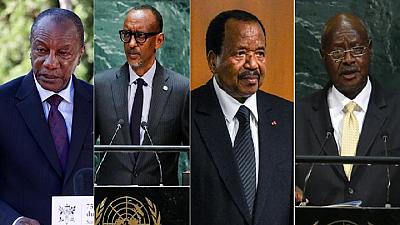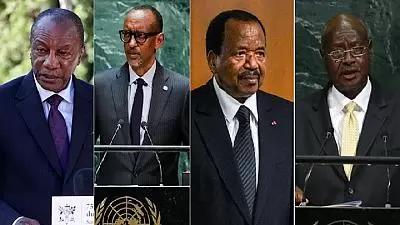

Last updated on September 11th, 2021 at 03:18 pm
Guinea’s president Alpha Conde has become the latest African head of state to seek an extension his legal mandate, a move that fuelled protests in the country this week.
If Conde tries to run for a third term in 2020, he would be copying from an established playbook in Africa, where incumbent presidents have sought, often successfully, to remain in power by massaging, bending or outright breaking laws often meant to ensure democratic handovers of power.
Below are details on how some of Africa’s longest-serving leaders have managed to stay in power, or are trying to do so, denting hopes of a dawn of democracy across the region.
Guinea’s Alpha Conde
Conde’s second and final five-year term expires in 2020, but the 81-year-old leader has refused to rule out running again. In September, he asked his government to look into drafting a new constitution, raising concerns he might use it as a reset button on his presidency and run again. Conde was first elected in 2010.
Burundi’s Pierre Nkurunziza
Nkurunziza, in power since 2005, announced in 2015 he would run for a third term in what his opponents saw as a breach of the constitution which only allowed leaders to rule for two terms. Since his re-election, hundreds of Burundians have been killed in clashes with security forces and half a million have fled abroad.
A referendum in May 2018 overwhelmingly approved changes that extended the length of presidential terms to seven years. Under the new constitution, Nkurunziza is now able serve a further two terms, potentially extending his rule until 2034. The opposition rejected the results and the United States said the process had been marred by voter intimidation.
Cameroon’s Paul Biya
Biya, 86 and sub-Saharan Africa’s oldest leader, took over the presidency in 1982. The national assembly adopted a constitutional bill in April 2008, removing a two-term presidential limit to allow him to extend his rule past 2011. He has won two elections since then that opposition candidates have said were fraudulent.
Chad’s Idriss Deby
Deby has ruled Chad since coming to power after a 1990 coup. A 2005 referendum removed a two-term limit from the constitution. Parliament approved a new constitution in 2018 reimposing the two-term limit, but it will not be applied retroactively, meaning Deby could serve two terms after the next election in 2021, potentially ruling until 2033.
Comoros’ Azali Assoumani
The president, a former military officer who first seized power in a coup in 1999, won a referendum in 2018 to extend term limits and end a system of rotating power among the archipelago’s three main islands off Africa’s east coast. The vote allowed him to run for two more five year-terms. The opposition dismissed the referendum as illegal.
Congo Republic’s Denis Sassou Nguesso
The constitution in Congo Republic was changed by referendum in 2015, lifting term and age limits that would have excluded Nguesso from running again. He won a new five-year term in a 2016 election, although the opposition rejected the outcome, alleging fraud. He has ruled for all but five years since 1979.
Djibouti’s Ismail Omar Guelleh
Lawmakers in Djibouti approved a constitutional amendment in 2010 that paved the way for Guelleh, in power since 1999, to run for a third term. He has won two subsequent elections.
Ivory Coast’s Alassane Ouattara
Ouattara, in power since 2010, has claimed the adoption of a new constitution in 2016 would allow him to run for a third term in the 2020 presidential race because a new constitution would mean the first two terms did not count. He has not yet said if he will stand for re-election.
Rwanda’s Paul Kagame
In 2015, Rwandans voted to extend the constitution’s two-term limit. Under the changes, Kagame could seek another seven-year term and two five-year terms after that, potentially remaining in power until 2034.
Kagame, who won a third term in 2017, has faced mounting criticism for what human rights groups say are widespread abuses, a muzzling of independent media, and suppression of political opposition. He denies wrongdoing. He first came to power in 2000.
Togo’s Faure Gnassingbe
Togo changed its constitution in 2019 to cap the presidential mandate at two five-year terms ostensibly in response to opposition calls for an end to a political dynasty that started when Gnassingbe’s father seized power in a 1967 coup.
However it does not take into account the three terms Gnassingbe has already served since coming to power in 2005, the latest of which ends in 2020. Gnassingbe could therefore remain in power until 2030.
Uganda’s Yoweri Museveni
Museveni has ruled Uganda since 1986. A term-limiting clause that would have prevented him from seeking re-election was deleted from the constitution in 2005.
In 2017, lawmakers voted to remove a constitutional limit on the age of presidential candidates, paving the way for 75-year-old Museveni to stand again in the 2021 election.
REUTERS
The U.S.-based driver training company Zutobi analyzed road safety worldwide and found South Africa stays last in driving danger since…
The Basketball Africa League (BAL) returns for its 2025 season with exciting changes and developments. Since 2019 the NBA-linked basketball…
The Somali president supports their military forces to eliminate the threats from Al-Shabaab, ISIS, and Al-Qaeda. The Somali National Army…
UAE President Sheikh Mohamed bin Zayed Al Nahyan held talks with President Faustin Archange Touadéra of the Central African Republic…
African football teams struggle intensely in the World Cup Qualification rounds to earn their place on the international football stage.…
The journey toward the 2026 FIFA World Cup is rapidly intensifying for all African teams, who now hold a historical…
This website uses cookies.